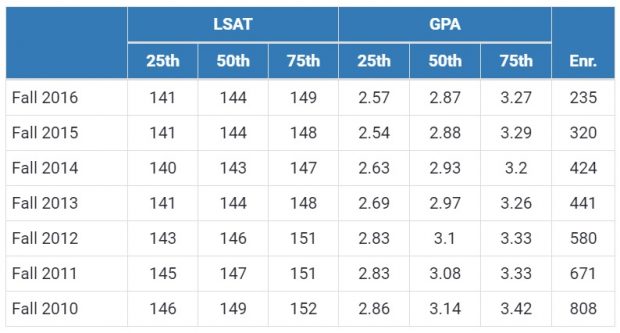ABA Continues To Crack Down On Law Schools That Admit Students Who Can’t Pass The Bar Exam
Which law schools will be the next to face the ABA’s wrath?
 Since last summer, the American Bar Association has been cracking down on law schools that violate its rules by continuing to enroll students who aren’t likely to graduate and pass the bar exam. Now that law schools like Indiana Tech, Whittier, and Charlotte have closed their doors, due in part to low student achievement, the ABA’s actions with regard to accreditation requirements have taken on all the more meaning.
Since last summer, the American Bar Association has been cracking down on law schools that violate its rules by continuing to enroll students who aren’t likely to graduate and pass the bar exam. Now that law schools like Indiana Tech, Whittier, and Charlotte have closed their doors, due in part to low student achievement, the ABA’s actions with regard to accreditation requirements have taken on all the more meaning.
We recently learned that the ABA decided to take two more law schools to task. Earlier this month, the deans of Florida Coastal School of Law and Atlanta’s John Marshall Law School received letters from Barry Currier, the ABA’s Managing Director of Accreditation and Legal Education, letting them know that their institutions were “significantly out of compliance” with accreditation requirements.
Specifically, both Florida Coastal and John Marshall were found to be in violation of Standards 301(a), 309(b), 501(a), and 501(b), which require that law schools have “sound admissions policies and procedures,” admit only applicants who “appear capable of satisfactorily completing its program of legal education and being admitted to the bar,” maintain “a rigorous program of legal education that prepares its students, upon graduation, for admission to the bar,” and provide reasonable academic support such that students will be able to “complete the program of legal education, graduate, and become members of the legal profession.”

Early Adopters Of Legal AI Gaining Competitive Edge In Marketplace
Only 47.7 percent of Florida Coastal graduates passed the state’s bar exam this summer. Results from the Georgia bar exam are due to be released this afternoon at 4 p.m., so we’re unable to comment on how John Marshall’s most recent graduating class performed on the test. Last fall, after years of terrible bar passage rates, John Marshall made passing a bar exam prep course a graduation requirement. Only 43.4 percent of John Marshall’s graduates passed the state’s bar exam last summer.
Here are the entering admissions profiles for both law schools since 2010. As you can see, their LSAT scores have gotten lower and lower following the recession:


Sponsored

Is The Future Of Law Distributed? Lessons From The Tech Adoption Curve

Legal AI: 3 Steps Law Firms Should Take Now

Navigating Financial Success by Avoiding Common Pitfalls and Maximizing Firm Performance

Navigating Financial Success by Avoiding Common Pitfalls and Maximizing Firm Performance
Dean Scott DeVito of Florida Coastal tells us that the school raised its admissions standards this fall, welcoming a new class with a bottom quartile LSAT score of 145. But that came at a cost. The school only enrolled 70 students this fall, and lowered its acceptance rate to 49.5 percent. Now that the school is smaller, it has adjusted staffing needs — and we’ve heard numerous reports that both professors and staff have been laid off as a result. This is what Dean DeVito said about the ABA’s letter:
I have to say that I was disappointed to receive a letter saying we are out of compliance with some of the Standards. While our outcomes are certainly not where we want them to be, I believe we are in compliance with the Standards and we are in the middle of drafting a response to the ABA due November 8. I suspect the primary concern the ABA has is with our recent bar pass results. My analysis shows that, while our results are not where we want them to be, we are currently in compliance on bar pass (Standard 316) and our models predict we will remain in compliance on bar pass until the effects of increased incoming credentials begin to bear fruit where we should exceed the requirements of the Standard (Florida Coastal’s goal is to have at least a 75% first time pass rate).
His full comments are available on the next page, and they’re worth the read.
Dean Malcom Morris of Atlanta’s John Marshall sent the letter to students earlier this week, urging them not to let the news distract them from their studies. He also asked that students not publicize the information: “I have shared this information only with members of our law school community at this time awaiting the posting of the public notice. Information such as this has a habit of being misrepresented which often results in creating unneeded confusion. Thus, I ask that you keep it ‘in house’ until after the posting is made.” We’ve contacted Dean Morris for his comments on the ABA’s noncompliance letters, but have not heard back from him.
We reached out to Kyle McEntee, executive director of Law School Transparency, for his take on these accreditation compliance letters from the ABA. Here’s what he said:
Sponsored

The Business Case For AI At Your Law Firm


Early Adopters Of Legal AI Gaining Competitive Edge In Marketplace
These letters appear to confirm two things. First, that the ABA continues to pursue law schools for predatory admissions practices. These allegations easily apply to several dozen schools, so I expect many more of these letters are in the works. Second, that the ABA has increased accreditation transparency in the wake of pointed criticism by the Education Department and others. The ABA has waited too long in the past to provide the public notice of noncompliance with the ABA Standards.
Florida Coastal must submit a report on its progress to the ABA by November 1, and John Marshall must submit a similar report by February 1. The compliance letters the schools received are due to be posted on the ABA’s website soon, but we’ve embedded them on the following pages in the name of transparency.
Which law schools will be the next to face the ABA’s wrath? There are more than a handful of schools that could use the possible loss of accreditation as incentive to improve the quality of their entering classes, and thus, the lives of their graduates. Only time will tell which law schools are on the chopping block.
(Flip through the following pages to see Dean DeVito’s comments, as well as the accreditation compliance letters that Florida Coastal Law and Atlanta’s John Marshall Law received.)
 Staci Zaretsky has been an editor at Above the Law since 2011. She’d love to hear from you, so please feel free to email her with any tips, questions, comments, or critiques. You can follow her on Twitter or connect with her on LinkedIn.
Staci Zaretsky has been an editor at Above the Law since 2011. She’d love to hear from you, so please feel free to email her with any tips, questions, comments, or critiques. You can follow her on Twitter or connect with her on LinkedIn.







